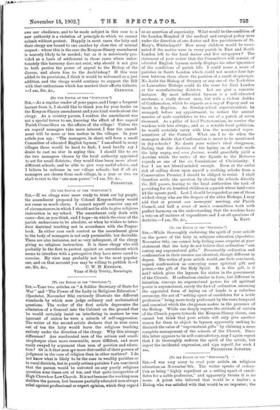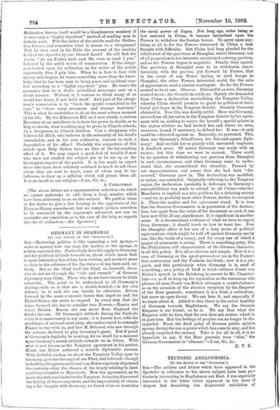[TO THE EDITOR OF THE "SPECTATOR. ") Stn,—I was very sorry
to read your article on religious education on November 8th. The writer speaks of ordina- tion as being " highly expedient as a setting apart of candi- dates for a noble profession," and apparently thinks it is no more. A priest who believed that would be a traitor; a Bishop who was satisfied with that would be an impostor; the
Ordination Service itself would be a blasphemous mockery if it were only a " highly expedient" method of sending men to definite work. Will the writer of the article read the Ordina- tion Service, and remember what it means to a clergyman P Will he then read in his Bible the account of the sending forth of the Apostles by our blessed Lord ? He will find the words, " As my Father bath sent Me, even so send I you," followed by the awful words of consecration. If the clergy- man looked upon his ordination as the writer of the article apparently does, I pity him. When he is face to face with misery and despair, he wants something more than the know- ledge that he has been sent to bring peace and spiritual com- fort according to a " highly expedient " plan. He wants the assurance that he is God's accredited messenger sent on a divine mission. Without it, I venture to think many of us would lose heart, if not faith itself. And part of the clergy- man's commission is to "teach the people committed to his care," to " drive away erroneous and strange doctrines." This is what he undertakes to do at the most solemn moment of his life. By the Education Bill as it now stands, a zealous Dissenter or an unbeliever is to have the power to decide, or to help to decide, what teaching may be given in Church schools, by a clergyman, to Church children. Can a clergyman who believes his Bible, who believes in the solemnity of his Lord's commission, and in his own ordination, consent to such a degradation of his office ? Probably the supporters of this attack upon Holy Orders have no idea of the far-reaching effect of it. We may expect a good deal of trouble if men who have not studied the subject are to be set up as the theological experts of the parish. It is too much to expect those who have been solemnly ordained to teach to ask those whom they are sent to teach, some of whom may be un- believers, to draw up a syllabus which will please them all. It is an insult to our religion.—I am, Sir, &c.,
A CLERGYMAN.
[The above letters are a representative selection—to which we cannot undertake to add—from a large number which have been addressed to us on this subject. We publish them in the desire to give a fair hearing to the opponents of the Kenyon-Slaney amendment, but we cannot profess ourselves to be convinced by the arguments advanced, nor can we surrender our conviction as to the view of the laity as regards the rite of ordination.—En. Spectator.]























































 Previous page
Previous page